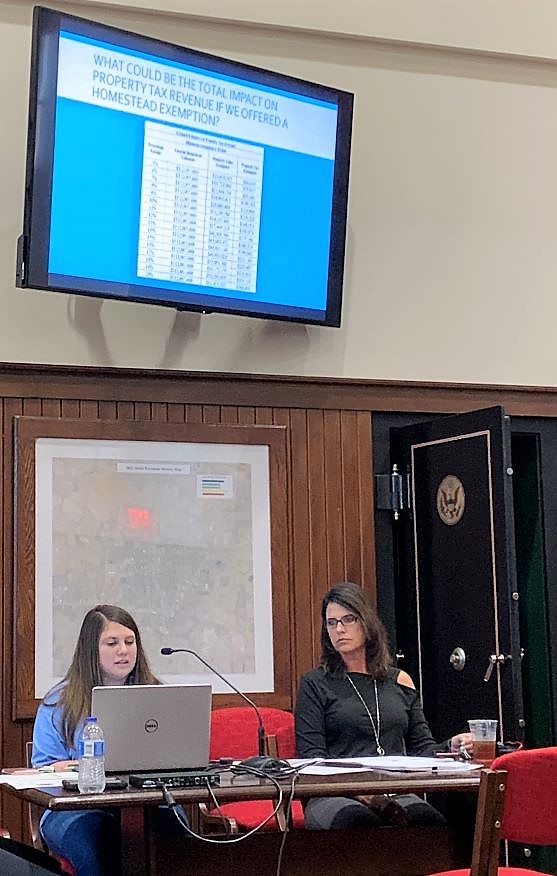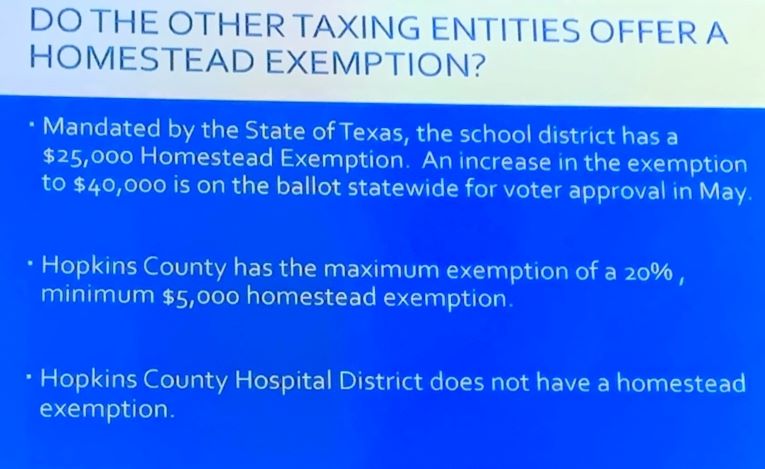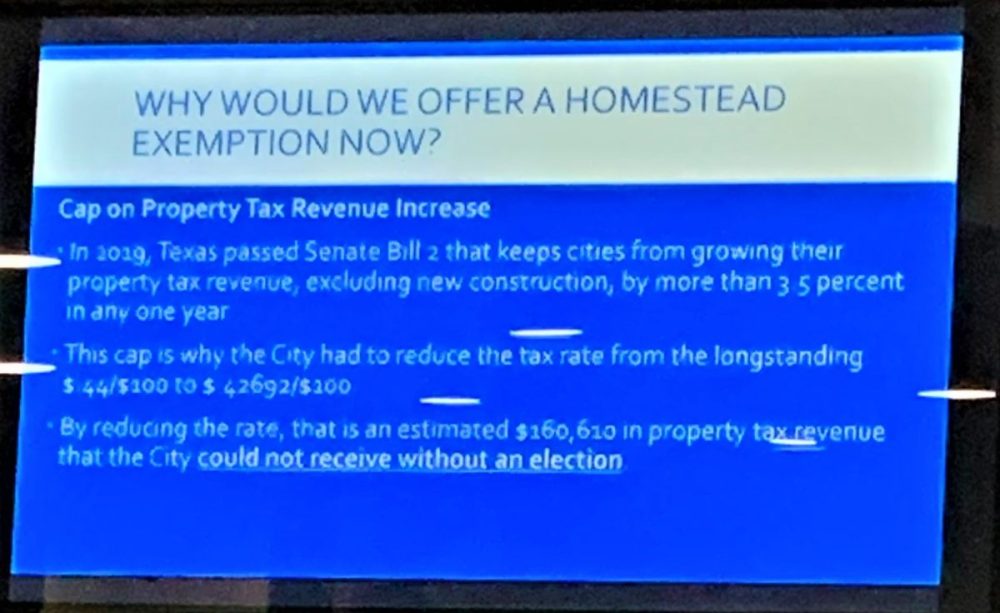Sulphur Springs City Council is expected this summer to consider implementing an ordinance granting homestead exemptions to residential taxpayers for city taxes.
Assistant City Manager Lesa Smith presented information regarding the taxing option during the regular City Council meeting Tuesday evening, April 5, 2022, noting that there is a specific timeline that must be followed if the city officials want to consider granting homestead exemptions in any given year, as allowable by tax laws.

Smith noted that a homestead exemption is simply a tax credit for an owner-occupied residential property. The exemption would reduce the taxing value on a home by the percentage set by the governing body, which in this case would be the City Council. A homestead exemption cannot be claimed by a property owner on more than one home. In other words, if the taxpayer owns five homes, that individual would only receive the exemption on the home he or she lives in.
A homestead exemption can be granted for up to 20% of the property value, but the minimum exemption is $5,000 of valuation. Aside from school districts, each taxing entity determined the amount of exemption allowed for that tax.
Currently, school districts are mandated by the state to offer a $25,000 homestead exemption. The upcoming election, however, includes a proposition asking Texas voters to consider increasing the amount of homestead exemption offered by schools from $25,000 to $40,000
Currently, in Sulphur Springs, taxpaying residents are offered a $25,000 homestead exemption on school taxes and the maximum 20% and minimum $5,000 homestead exemption on county taxes. The hospital district and city do not currently offer homestead exemptions for Sulphur Springs residents on their home property taxes.
The tax roll or the City of Sulphur Springs included 2,714 homesteads with a total value of $312 million. Approximately, 5,020 single family homes on the tax roll, that would mean about 54% of homes would qualify for a homestead exemption.
In other words, if the city had a 5% homestead exemption, that would be about $15.6 million of property value that’d be exempted for a total of $66,000 in property tax exempted. A 10% homestead exemption would be $31 million in property value exempted and approximately $133,000 exempted in property tax. A 20% homestead exemption would mean about $62 million in property value exempted and $266,456 in property tax exempted.
Smith noted that the city did take into account when figuring the overall impact on city taxes, homesteads valued at $100,000 or less, which would actually be an exemption of more than 20% because their normal overall tax bill would be less than the $5,000 minimum exemption. So no matter what, if a homestead exemption is granted, individuals’ tax bills would receive no less than a $21.35 savings.
The average taxable value of a home in Sulphur Springs is $115,000. So the average homeowner would save $24.55 on their tax bill if the city were to set a homestead exemption at 5%, $49.10 savings with a 10% exemption, $73.65 savings with a 15% homestead exemption and $98.20 on a 20% exemption on the average home property valued at $115,000, Smith explained.
Smith acknowledged that the city is not immune to inflation, The city faces the same increases in materials and fuel costs as everyone else and is in a competitive labor market. However, no matter the state of the economy, the city has a limit on the property tax that can be brought in from existing properties.

She noted that the cap on property tax revenues has increased as well. In 2019, she reminded the council, Texas passed Senate Bill 2, which keeps cities from growing their property tax revenue, excluding new construction, by more than 3.5% in any one year, That cap required the city to reduce the tax rate from the longstanding $0.44 per $100 property value to $0.42693 per $100 property valuation. Reducing the tax rate results in $160,610 in property revenue the city isn’t able to receive without holding a tax election.
Under SB 2, commercial and industrial properties received the bulk of savings compared to residential property owners. The average homeowner saved about $13 on their property tax bill. Owners saved about $81.50 on an average commercial property and about $955.9 on the average industrial property through the SB 2 tax rate deduction. That’s 41% of the savings going to residential and the remaining 56% to commercial and industrial properties.
Smith noted that there’s an imbalance between the growth of commercial and residential properties and their values, set by appraisal districts in accordance with laws set by the state. Residential appraisals are based on market values based on the amount homes are selling for in a given neighborhood, proving residential property owners with less room to protest appraised valued. There are several different ways commercial appraisals can be done on commercial property, especial that owned by large businesses.
“So while both businesses and residents are every important to the City, homestead exemptions allow the City to provide property tax savings to the residents first,” Smith said, providing a savings to the people who live and work in Sulphur Springs.
To illustrate the imbalance between single family residential property growth and commercial property growth from 2018-2021, Smith said 8 existing homes and 8 existing and commercial/industrial properties were selected at random.

The sample shows the value of single family residential growth increasing 1.15% in 2018, 3.99% in 2019, dipping 0.06% in 2020 (COVID), then spiking 14.86% last year. The market value for the 8 sampled commercial/industrial properties, however, decreased 0.19% in both 2018 and 2019, and dipped 0.26% in 2020. While the market value on the eight commercial/industrial properties rose 7.53% in 2021.
Looking ahead, Smith said using the 2021 tax information, the actual tax at $0.42692 per $100 property value would be $853.86, giving the city a little over $5,132,000 in tax revenue. If the city this year had implemented a 10% homestead exemption, that rate rate $0.43839, but the tax on the $200,000 home would have gone down to $789.20. Estimated tax revenue, however, would have been slightly higher with $5,133,000 instead of $5,132,000.
If the city has a 10% growth on the 2022 tax roll, with a 10% homestead exemption, the tax rate would be $0.40833, making the tax bill $734.99 on $200,000 home. The total property tax revenue would still go up $5,237,618.
A 10% growth in 2022 with no homestead exemption in 2022, the tax rate would be $0.39735, but the taxes taxes on a $200,000 home would $794.70, and total property tax revenue for the city would be $5,233,000.
In the long run, if the area experiences a recession, which is being projected, property values will begin to decrease. With the way the state has set the law regarding taxable values on homesteads, taxable values are capped at a 10% growth each year. So that could mean that taxable valued could continue to increase during a recession.
She gave examples from among the houses among in the samples compiled to show the disparity in residential and commercial, industrial growth disparities. House 1 was valued at $67,500 in 2020, but the market value on the tax roll was $87,540. Because of the 10% cap however, House 1 could only go up to $74,250 on the tax roll. It would take it 3 years in order for it to reach the market value of 2021 based on the 10% cap.
“So, you can see, despite a recession, if the values weren’t lowered to pre-2020 values, then it could actually continue to increase over the next year,” Smith said. “On the homestead cap offs, in 2020 we had $7 million of valuation that was lost on the 10% cap. Last year, we lost $30 million on that loss. So we are going to continue to see that increase go on the tax rolls year by year.”
City Manager Marc Maxwell asked Smith to come back the May Council meeting with figures to show 10% growth and 20% homestead exemption, with the de minimis rate.
Smith said she would be glad to do that as well as provide calculations using the $5,000 minimum exemption as well.
Mayor John Sellers thanked her for presenting the information in a manner that made the complicated topic more easily understood. Sellers also said he would like to see the homestead exemption option on a future City Council agenda.
Smith noted that if the City Council wants to put for a vote a city homestead exemption, it would have to be approved by ordinance by July 1 in order to go on that tax year’s taxes. So in order to consider it this year, the proposed city homestead exemption ordinance would need to be presented for first reading on the May 3 City Council agenda, the second reading on June 7. The city would then receive tax values in July, the tax rate would be passed September and in October the property tax would be levied.






